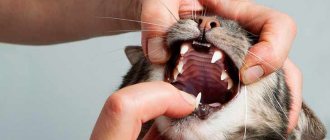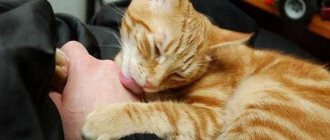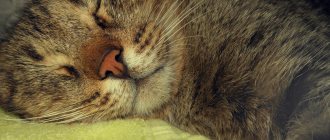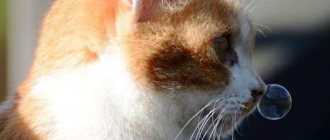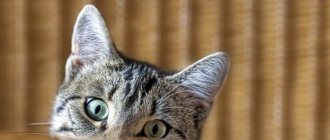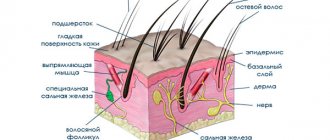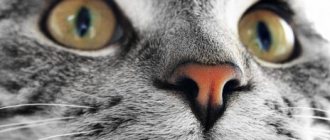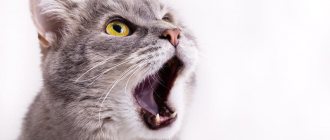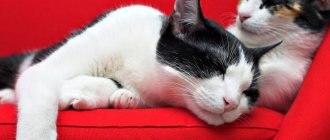Probably every owner of a furry purr has at least once observed the picture of his pet sitting or lying with his tongue hanging out. Initially, this touches and even causes laughter, but if it is repeated often, then, of course, it causes anxiety and worry in the owner. After all, the tongue is an important organ for cats, which is involved in many processes: from eating to self-care. Therefore, it is important that it is in its place, that is, in the mouth. If you notice that your cat systematically sits with his tongue hanging out, then do not delay a visit to the veterinarian, because this can be either a completely innocent “fun” or a symptom of a serious illness.
Diseases that may cause a cat to stick out its tongue
- Serious damage to the jaw
- Insufficiency of the cardiovascular system
- Disruption of natural processes occurring in the brain
- Mental disorder, nervous overstrain, severe fear
- Brain injury
- Increased body temperature
- Muscle atrophy
- Dental problems
- Breathing problems
- Disorders of the salivary glands
- Recovery from anesthesia. The cat will be able to completely close its mouth only a day after it.
- Sores or ulcers in the mouth.
- Stomach-related diseases: vomiting, diarrhea. The cause may be poisoning.
Pathologies requiring treatment
As you can see, cats stick out the tip of their tongue quite often, and in most cases this is not a reason for panic, but in combination with a number of other symptoms, it may indicate the presence of health problems.
So, let's figure out when your pet should be taken to the vet as soon as possible.
Heart diseases
A cat can stick out its tongue with cardiomyopathy, ischemia, hypertension, heart failure and many other diseases of the cardiovascular system.
Read also: Potato salad with squid
Heart failure is a serious disease in which the animal may experience pulmonary edema. If a number of other diseases can occur unnoticed by the owners, then the symptoms of heart failure are difficult to miss:
- cardiopalmus;
- shortness of breath and abdominal breathing;
- bluish discoloration of the gums and tongue;
- lack of appetite;
- loss of coordination and paralysis of the hind legs.
Kidney diseases
The most common diagnosis is kidney failure, the symptoms of which give the following picture:
- shortness of breath and protruding tongue;
- ammonia odor from the mouth;
- strong thirst;
- digestive disorders (diarrhea, vomiting);
- frequent urination;
- swelling in the abdominal area;
- weight loss;
- deterioration of coat condition.
Diseases of the oral mucosa
A cat may also stick out its tongue due to stomatitis or gingivitis.
The reasons for the activation of the inflammatory process can be very diverse, so for proper treatment it is necessary to identify the causative agent and select a drug that affects exactly the virus, fungus or bacterium that caused the disease.
Symptoms:
- redness of the mucous membrane (partially or completely);
- ulcers on the mucous membrane (not always);
- protruding tongue and heavy salivation;
- unpleasant odor from the mouth;
- soreness of the mucous membrane and, as a result, the animal’s refusal to eat due to constant thirst;
- temperature increase.
Respiratory system diseases
Cats, like people, are susceptible to colds. Ordinary rhinitis (runny nose) or a viral infection without proper treatment can be complicated by bronchitis or pneumonia (pneumonia).
The following symptoms will indicate that it is necessary to show the cat to a veterinarian as soon as possible:
- heavy breathing with coughing, wheezing;
- discharge from the nose and eyes;
- refusal to eat;
- voice change;
- apathy;
- temperature;
- digestive disorders.
Other diseases
Of course, this is not a complete list of diseases in which a cat can constantly stick out its tongue. This symptom can also be observed with:
- a stressful state (visit to the clinic, the onset of labor, the arrival of a new animal at home);
- foreign body entering the respiratory tract;
- jaw injuries;
- tumors (benign and malignant);
- allergic swelling of the tissues of the larynx and tongue;
- various poisonings;
- disruption of brain function.
Tongue protrusion when feeling normal
- Kittens may stick out their tongues when they are very tired after playing or a day full of different experiences. The protruding tip of the tongue indicates that they are tired and want to sleep.
- The tongue may stick out from behind the mouth when the cat is relaxed or sleeping. When an animal is in this state, this organ becomes slightly elongated and may not fit in the mouth.
- Rapid breathing, which appears in a pet after games, a long run and other vigorous activity, contributes to the desire to stick out its tongue. This promotes active saturation of tissues with oxygen.
- This way the cat can escape the extreme heat. This is explained by the fact that the pet does not have sebaceous glands, like humans, and it somehow needs to protect itself from overheating.
- Expressing emotions during play or other activities. A cat can express its attitude towards something this way or simply tease its owner. If this behavior has already become a habit, then there is no need to worry. The alarm should be sounded if there is a suspicion of a certain disease.
Physiological norm
It is normal for a cat to walk with its tongue hanging out in the heat, when under stress, during childbirth, and in some other situations.
Heat
The body of domestic animals is covered with thick hair, and they have significantly fewer sweat glands than humans. In hot weather, body temperature rises, especially during periods of activity. It is difficult for the body to maintain it at a comfortable level - thermoregulation is facilitated by the tongue. Moisture from its surface evaporates, body temperature gradually decreases.
Overheating can be determined by indirect symptoms:
- intensive eye hydration;
- outflow of saliva;
- looking for a cool place.
Owners should turn on the air conditioner or move their pet to a cool room with fresh air to avoid overheating and heatstroke.
Powerful emotions
Experiences and strong emotions are a common cause of changes in behavior. A stressed animal licks its lips, opens its mouth and breathes rapidly. Cats in this state will stick out their tongues and drool. Increased salivation is typical for males due to physiology.
The reaction to stress is considered natural: as soon as the pet calms down, it will hide its tongue. The saliva will also disappear. Owners can speed up the process by picking up the animal and lightly stroking its fur.
Relaxation
There is no cause for concern if your cat sleeps with its tongue hanging out. He is in good shape almost around the clock, but in deep sleep the animal relaxes, does not react to what is happening around him, and does not hear anything.
The tongue also relaxes and increases slightly in length, so the tip protrudes beyond the mouth. This often happens in breeds with shortened muzzles or malocclusions. There is no threat to health.
Interesting fact. In the wild, there are hardly any individuals capable of completely relaxing - danger can lurk everywhere, so animals are always on the alert and do not lose their vigilance. Sound sleep is the privilege of domesticated animals that are not in danger.
Passion
Pets remember their owners' gestures and use them when they are in dire need of communication. They show the tip of their tongue, imitating a smile and attracting the attention of their owners.
Adults, reaching puberty, stick it out, flirting with the opposite sex. Males behave this way when they smell a female.
Features of cat physiology
- In hot weather, the animal's heat exchange may be disrupted. This is what the sticking out tongue says.
- If this behavior is accompanied by aggression and increased salivation, this indicates the presence of rabies or another serious infectious disease.
- The organ does not fit in the mouth. This may be a feature, or it may indicate the presence of oral diseases. This could be damage to the mouth, jaw or teeth.
- Mental retardation from birth. In such inferior kittens, which could have been bred in the process of crossing several breeds, this is an innate feature.
- Expression of fear at sharp, loud, unpleasant sounds. Many cats react this way to tape coming off. And for some others, such a reaction is observed with the cotton that is heard when champagne is opened.
- This unusual behavior may be quite normal for certain breeds of cats. Most often, this is how four-legged friends show their devotion and trust in their owner. However, some express delight in this way.
- Impaired sense of smell. The pet sticks out its tongue because it cannot catch some odors. And this causes him some inconvenience.
- The onset of labor, which is accompanied by strong nervous tension and intense licking of fur. Due to excitement and unpleasant sensations, the cat simply forgets about this organ, and it involuntarily falls out of its mouth.
- A bone stuck in the mouth, teeth or even throat. This is usually accompanied by certain sounds: coughing or snorting. The cat may also try to pick at its mouth with its paw. If you notice such symptoms, you should immediately contact a veterinary clinic.
- This is how pets can react to dogs. Especially if they have already had unpleasant experiences with these animals.
Veterinarians' opinion
But not all physiological reasons can be considered normal, although in these cases it is hardly possible to help the pet. You just need to carefully monitor his condition.
Read also: Why do people wear masks in Japan?
Structure of the skull
With a brachycephalic skull structure, the cat’s tongue is also constantly visible, since the mouth is half open. This is typical for some breeds with malocclusion, for example, Exots, Persians.
Costs of breeding work
When breeding many beautiful and exotic breeds, defective individuals are sometimes born. For example, with dropsy of the brain, joint disease, abnormal structure of the spine. Often with these pathologies, animals are forced to breathe with an open mouth with their tongue hanging out.
A striking example of this is the cat Melissa, who suffers from a severe disease called osteochondraplasia. In this case, acute bone dystrophy also affected the jaw. Her tongue does not retract into her mouth at all. And although netizens are touched by her image, similar to the famous photograph of Albert Einstein, both the pet and the owner suffered a lot from such a life. Veterinarians advised to euthanize the animal, but the cat's owner decided to take care of the baby until the last minute.
How to determine whether it is normal or pathological
In order to understand what is happening to the pet, whether a protruding tongue is a normal physiological reaction or a pathology, experienced veterinarians recommend touching the tip of the cat’s tongue with your finger.
If it immediately retracts into place, then there is no cause for serious concern. When the cat initially hid his tongue, and after a short time began breathing through his open mouth again, it is better to go to the clinic.
Although professional breeders first examine the pet themselves:
- Mouth - for stuck objects and ulcers (gingivitis or stomatitis).
- Eyes - whether there is conjunctivitis or lacrimation.
- Nose—stuffiness or mucus discharge.
- Ears, tail, paws, whole body.
In addition, they check the general reactions of the body and measure the temperature.
What to do
If you suspect that the kitten has a specific facial expression because it is sick, you need to visit a veterinarian and strictly follow his instructions. Don’t worry that you will bother the specialist unnecessarily. An examination is never superfluous, and it is much better to know for sure that everything is fine with the cat than to cause the disease to develop.
We figured out why cats stick out the tip of their tongue, and now you can easily understand when a tongue sticking out causes a smile, and when it is a menacing symptom. If you have any doubts, it is better to see a veterinarian.


